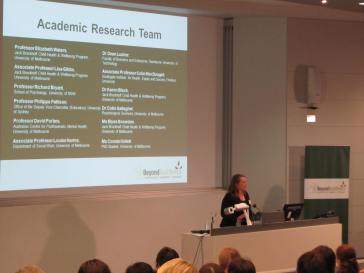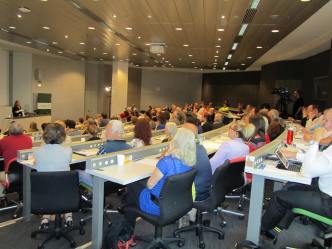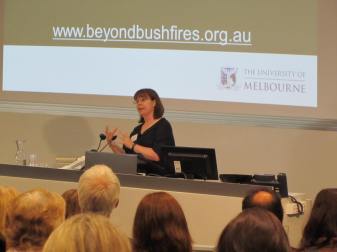The Beyond Bushfires Symposium was an all-day event held at the University of Melbourne on the 30th October, 2014. It provided an opportunity for the study investigators to present and discuss our preliminary findings with participants and community members as well as service providers and representatives from government. I really valued the engagement leading up to the event, on the day and the feedback that we received afterwards. Leading up to the big day there was so much interest, and with the 140 seat room booked out we had many people discuss their interest in the study and perspectives on the findings.

Professor Elizabeth Waters introduces the academic team at the Beyond Bushfires Symposium October 2014
We had a full agenda that included presentations on social networks, diverse responses and reactions, couples, families and children, psychological outcomes, anger, bereavement, relocation, and separation during and immediately after the fires. The day was packed with information that was quite overwhelming in terms of scope and depth. The surveys gave a sense of the extent and pattern of impacts on individuals and communities, and the in-depth interviews gave a sense of the personal and individual experiences that people went through. Lesley Bebbington, local resident and youth worker, shared her heartfelt, emotional and extremely personal journey over the last five years. We felt that hearing from someone who had personally experienced the bushfires gave an insight into the impacts it has on one person’s life before we went on to discuss the broader, population impacts of the bushfires.
The Symposium brought together study partners and community members to discuss their views on the research and its importance for everyone involved. This dialogue provided an insight into the extraordinary input by multiple parties throughout the study, including consultations with community members/groups, local and state service providers and government departments from planning and designing the study, to interpreting results. The large contribution to discussions and debates regarding different aspects of our findings was incredible and really fulfilled our aim for the day. You could feel the passion and emotions being expressed from those who our findings have direct influence on. The interactive sessions provided great insight into future directions and issues of interest to local bushfire affected communities.
Some people within the audience were interested in the study methods and conclusions and who was involved in forming these conclusions. Additionally, there were discussions around what we hadn’t included within the study and we acknowledge that we couldn’t include everything and we had difficulties in making decisions regarding inclusions. But there is a large amount of research being undertaken in this area, and we hope that others can cover the important components that are beyond the scope of our study.
A few community members were worried about their emotions and possible distress that could result, and showed great courage in attending the day. I’m so glad these people attended after their contributions to our study, the symposium gave us a chance to feedback our findings and get responses and inputs for future considerations. The Symposium was also a chance for us to thank everyone who has supported the research, and gave us an avenue to share bushfires experiences, and learnings to inform service providers and state level organisations.
If you would like to keep informed of the research, please email info-beyondbushfires@unimelb.edu.au with the subject line “Add to mailing list” and you will receive updates on our project, including access to the presentations on the day, once they become available. Additionally, visit our website to access the latest findings and publications www.beyondbushfires.org.au


